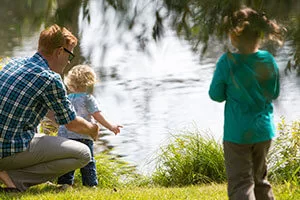All Ages
Montessori Classroom Principles Work at Home, Too!
May 2020 by Paula Lillard Preschlack Children need time, choice, grace and courtesy as part of their daily lives to develop inner calm. Here Paula shares ideas to cultivate these themes at home.
Read MoreTalking to Children About the Uncertainties of Life: Updated for Coronavirus (March 2020)
March 2020 by Paula Lillard Preschlack By respecting children’s feelings and experiences by asking questions and listening, adults can prepare to talk to children about the inevitable, but unfortunate, events that occur in their lives.
Read MoreUniversal Children: Manifesting Montessori’s Vision
December 2019 by Paula Lillard Preschlack Dr. Montessori’s approach emphasizes the importance of human diversity. Montessori children develop a natural appreciation and respect for all peoples, learn to be open to new ideas, seek to understand one another’s perspectives, and to see the value of synergy.
Read MoreGetting Your Children to Read at Home: Building a Family Culture
November 2019 by Paula Lillard Preschlack Reading to our children and creating a culture of reading is increasingly important to their success in academia and in life. Here Paula makes suggestions on choosing reading content for children and give ideas to make your home more welcoming to reading and family time.
Read MoreTalking to Children About Money
August 2019 by Paula Lillard Preschlack Talking about money can be uncomfortable for some families. Maria Montessori believed that this topic should be studied like all others. Here, Paula offers suggestions for talking to children of all ages about money.
Read MoreCultivating the Scientific Mind: Montessori Science, Part II
May 2019 by Paula Lillard Preschlack A continuation of Montessori Science Part I (see below), this blog discusses how a Montessori education fosters deeper scientific inquiry throughout a child’s Elementary and Secondary Level years.
Read MoreThe Birth of the Scientific Mind: Montessori Science, Part I
April 2019 by Paula Lillard Preschlack A scientific mind is one that can classify and organize information in a systematic and logical way. Experiences with the Montessori materials and in nature are excellent starting points for building a scientific mind.
Read MoreIn Pursuit of the Correct Answer: The Role of Process and Discovery in Montessori
February 2019 by Paula Lillard Preschlack In a traditional school setting, a child’s understanding is often measured in errors and wrong answers. The Montessori approach to education, on the other hand, gives children the opportunity to arrive at the answers through exploration and repetition, a process that allows children to confidently take ownership of their…
Read MoreThe Four Planes of Development: Child Development in Four Questions
September 2018 by Paula Lillard Preschlack Maria Montessori’s extensive observations of children revealed four universal planes of development. Montessori designed an entire educational system around these stages of childhood, which we discuss here in detail.
Read MoreOur Living Land Laboratory
August 2018 by Paula Lillard Preschlack A small prairie can teach children learn about land stewardship and the interconnectedness of the natural world.
Read More









